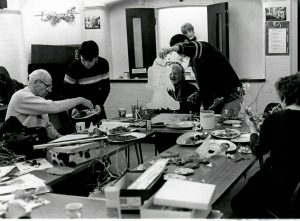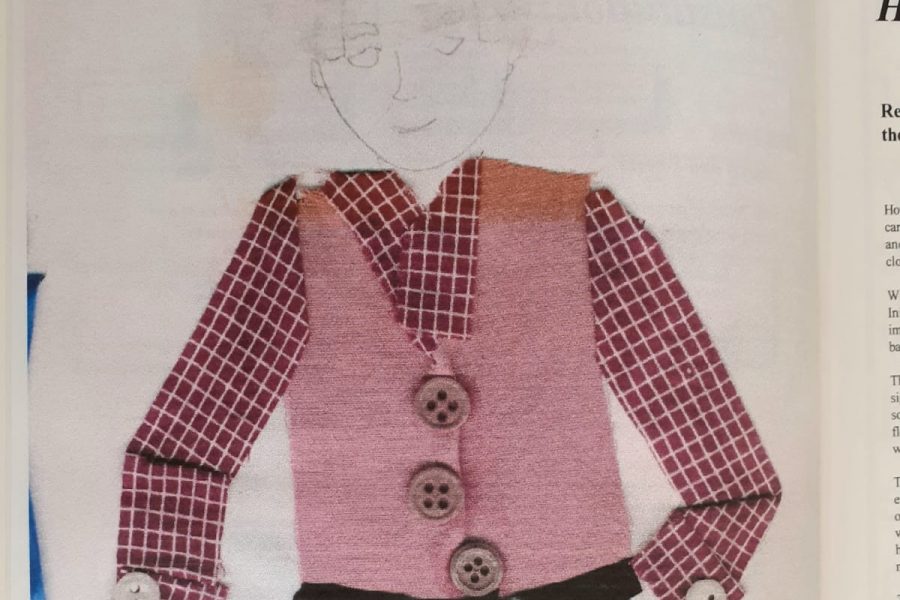Archive Blog: Rediscovering our Histories programme (1996)
by Rebecca Swift, Creative Director, an Entelechy Arts artist
Rediscovering our Histories was a three-year development programme funded by the Department of Health, coordinated and developed by Entelechy Arts artist and dance academic Mara de Wit.
During the 1980s people with learning disabilities moved from long stay hospitals like Darenth Park to live in their local communities, as a consequence of the 1983 Community Care Act. Many people with learning disabilities who had been separated from their families often at birth, to be brought up in long stay hospitals, had lost touch with their families, and had very little or no information about their identity and origins:
“It is widely recognised that many people who lived in ‘mental handicap hospitals’ often became disconnected from their family and friends and in some cases no longer knew their real names, date or place of birth” (from a 1996 Entelechy Arts booklet).
Through Rediscovering our Histories, people with learning disabilities navigating the massive change from living in big institutions to supported housing in ordinary streets, collaborated with artists and volunteers to make sense of and share their life stories with each other. The sessions were a creative space to integrate their sense of the past with the present; craft the stories of their memories, explore different creative ways to communicate their own identities, and in some cases even re-connecting with lost friends or family.
Looking at the photo below of one creative sessions called Crafting our Memories, over 3 decades ago, you could mistake it for a glimpse into a Meet Me at the Albany (MMA) session today. Everyone is creating art around the table with cups of tea and biscuits and gossip.
Like MMA this programme was also supported by volunteers. PhD research student Melissa Nash was on placement with Entelechy Arts for two years and wrote extensively about Entelechy Arts’ work in her thesis The ‘arts’ as cultural intervention for people with learning disabilities: A voluntary sector ‘community’ initiative in south-east London.
Below we have a wonderful piece of writing by Mara de Wit, hidden within an old annual report from 1996/97, describing how we might find a way to rediscover our stories and sense of self through art and culture. She emphasises the importance of sensory and non-verbal creative communication to share stories when words fail or when we communicate through other means other than words. The questions she poses and the paragraph by Entelechy Arts founder David Slater in the same annual report (added at the end of Mara’s piece) illustrates just how pertinent and alive this work still is, especially in our collaboration with residents in care homes within our Walking Through Walls programme. Again, we find ourselves working with residents of care homes to make sense of our life journeys and feel part of the local community beyond the walls of often a large institution, contributing back.
How are you recognised?
Rediscovering our Histories Co-ordinator Mara De Wit poses some of the key questions informing the first year of the projects work.

Visual art, tea and stories with older people with and without disabilities led by Mara De Wit with support from Melissa Nash at Time and Talents Community Centre Rotherhithe.
How do you convey your life, aspects of your self, what do you tell, share, show to others? What do you carry with you and keep as evidence of your existence in this world, memorabilia of events, people, times and places… remembered through certain objects, a ring, a special stone, a seashell, photographs, items of clothing, or an old empty perfume bottle which still smells and you of the past.
With what do you arrive? How are you recognised?
Initially people perceive the obvious such as accent, gender, age, colour of hair, skin, eyes. These first impressions suggest information about our identity in terms of origin, geographical and cultural background.
The constructing of identities (although a virtually automatic process) is informed by numerous signs and signals, picked up in an instant. These include, when seen – manner of dress, hair style; when heard – the sound of the voice, the pitch or tone; when observed – the body, quality of movement, posture, balance, flow of energy. All these features contribute to and determine how we appear to each other and suggest who we are to others.
The missing bits of our lives can be as important to our sense of identity as the obvious, visible features, exposed to and reflected by others in a brief moment. We all experience this at times, when losing a bag, or a diary, important documents, addresses and contacts. This is more evident with the loss of people, when an important person dies, or a loved one leaves our life. These people can be seen to hold bits of our history through shared experience and like a mirror are able to reflect aspects of ourselves through shared memories of events, people, times and places.
The question ‘How do you convey your life’, becomes more pertinent when unable to express one’s experience by conventional mean such as verbal language. When the abilities to speak, hear, see, or even gesture are affected, possibly limited due to sensory and/or physical impairment, then other ways of communication become important territories to investigate, explore and expand on.
This arena, the practical exploration of other ways and means of recording and communicating has been part of the first year of the “Rediscovering our Histories” programme.
‘Equality is a vital need of the human soul. It consists in a recognition, at once public, general, effective and genuinely expressed in institutions and human being as such and is not a matter of degree.’ – Simone Weil: The Need for roots
“What is real? We may not yet have fully acknowledged the experience of those who survived exile in the hospital wards. Are the lives of some people now living in the community significantly different? The tensions between reasonable aspirations and disappointing reality in the development of new learning disability services has been continually noted (1)” – David Slater (from Entelechy Arts 1996/97 annual report)
Rediscovering our Histories also produced a training pack called ‘Rediscovering Our Selves: The recovery and communication of the lived experience of people with learning disabilities’, written and designed by Mara de Wit and David Slater and published by Pavilion.
(1) Jackie Tunrer and Davivd Towell: Reflecitons on ‘An Ordinary Life’ (1997)


